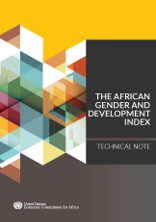The African Gender and Development Index - Technical Note

African governments have signed and ratified a number of international and regional declarations, conventions and protocols and integrated them into constitutions and legislative frameworks. They have also implemented policies aimed at promoting gender equality and empowering boys, girls, men and women.
There is a need to assess the progress being made towards achieving gender equality and women’s empowerment, while key gender inequalities must be identified and policy interventions introduced. The African Gender Development Index (AGDI) was introduced by the Economic Commission for Africa (ECA) in 2004 to measure gaps between the status of African men and women and assess the progress made by African governments in implementing gender policies.
The ECA African Centre for Gender (ACG) prepared this note to ensure common understanding of the process by participating countries and assist them in implementing it effectively. It served as the main background document for the AGDI phase 4 methodology workshop held in June 2016 in Addis Ababa. The note is based on the AGDI Manual1 and an unpublished manuscript on the AGDI prepared by ACG2
Section II of the note discusses the importance of gender statistics and measuring progress towards gender equality. The third section discusses the objectives and composition of the process leading to the calculation of the AGDI, using examples from AGDI country reports. Section IV looks at the AGDI process. The issues discussed in this section include: the role of national gender machineries and national advisory panels in driving the AGDI process at the national level; ECA support to AGDI countries, including organization of the AGDI methodology workshop; and the administrative and financial processes involved in the AGDI process.
1 Economic Commission for Africa (2011). The African Gender and Development Index 2011: Promoting gender equality in Africa. ECA. Addis Ababa.
2 Economic Commission for Africa (Unpublished manuscript). The African Gender and Development Index: An assessment.